One day dedicated to learn about Palm Oil industry from the perspective of local people in Sabah, Malaysia.
Why is this interesting?
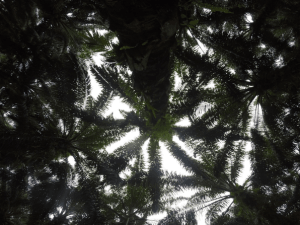
My interest in the palm oil industry started due to the current news in Colombia, my home country, (currently fourth producer of Palm oil worldwide after Indonesia and Malaysia) to increase its production of palm oil in order to supply the upcoming biodiesel demand from Europe. Palm oil is used not just for the processed food industry but also for the personal care industry and to produce biodiesel, generally called biofuel, among other uses. The mixture of biodiesel used for cars in Europe is desired to increase from 5% to 10% by 2020, which means that, according to the report funded by the European commission and published in 2015 about the land use change (LUC) impact of the biofuels consumed in Europe, it will be required to change the use of 8.8 Mha to increase the feedstock and accomplish the goal. From those 8,8 Mha, according to the report 2,9 Mha of conversion will take place in Europe and 2,1 Mha will take place in South East Asia under the pressure from palm oil plantations. All this information made me decide to explore more on this topic and join the journey to Sabah in Malaysia to get the perspective from the local people living along the Kinabatangan river in South East Asia.
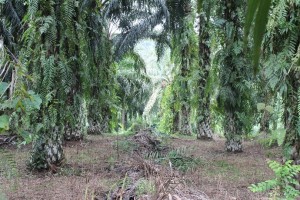
So, what’s palm oil history?
Palm oil is definitely not new in Malaysia and in any other country producing it. The crop’s boom developed as early as the 60’s or 70’s and has been the following step in the deforestation process initiated by the timber industry. In Sabah, in 1968 the government established regulations for cutting down trees according to the trees diameters. This action added up to the decay in timber quality reducing the interest and possibilities for the locals to make a living from the timber industry. As this point in Sabah as in other countries such as Indonesia and Colombia, the use of land/forest changed sharply. As has been documented in the book Land’s end, farmers and people from rural areas welcomed the new cultural change called “cash crops”. The availability of cash created new opportunities to send kids to school and even college, build houses with better materials such as zinc and spandex and also created the need for cash, eliminating the culture of exchanging products.
Back to palm oil, this crop has evolved as the preferred crop in rural areas. It has the yields the highest production rate than any other vegetable oils, it is the less resources consumer crop among other agricultural products and due to its sharply increase in price, it is the highest profitable product in the agriculture economy.
So what’s the problem and how Kopel is being part of the solution?
During our experience with Kopel, an organization promoting ecoturism and leading restoration initiatives in Sabah, we had the opportunity to learn about palm oil from the local people. Fikri, one of our guides, gave us his personal opinion about palm oil industry and along with Martin, the director of the organization, enlighted us with key information. Fikri, is a young man of 24 years old, his father owns a 16 acres land dedicated to palm oil. He and his father have side jobs too but thanks to the profits of palm oil Fikri had the opportunity to go to the university and has become a great support for Kopel’s environmental initiatives. According to Fikri, it can be harvested from 14 to 20 tons of product in a month with the size of his plantation and 1 ton is currently worth 300 to 400 RM or about 1600 USD.
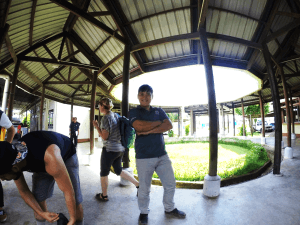
An important clarification was that almost everyone in Sabah owns a land dedicated to palm oil, thus, the enhancement in livelihood has been fairly homogeneous in all Sabah, which is a pretty different situation than the ones in Indonesia and Colombia where the majority of the population, where palm oil industry developed, does not own a land and were forced to switch from farmers to laborers creating a big gap between wealthy and poor people within the region.
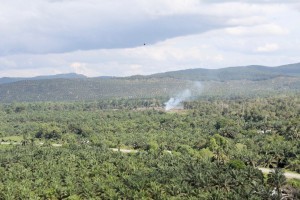
Besides the social issues, Fikri gave us his perspective being a beneficiary from palm oil profits and working with Kopel, which since 1999 started promoting ecotourism as an financial source alternative for locals and currently dedicates a lot of efforts to restore the buffer areas along the Kinabatangan River and supports certified palm oil extraction. Fikri’s words were: “We need to preserve the environment but also to make a living, it (referring to palm oil plantations) just has to be sustainably managed”
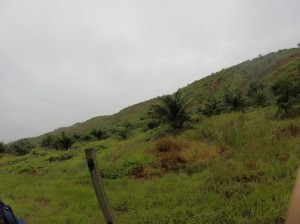
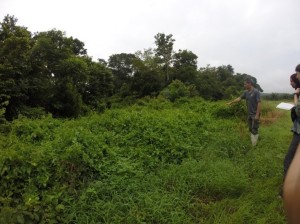
Martin, Kopel’s director, explained how aware his staff is about the environmental impacts of Palm oil industry, such as more frequent and stronger runoff from the drained and deforested areas, the higher concentrations of nutrients such as phosphate and nitrate from fertilizers (used in the plantations) discharged in the river (fishing has been reduced), the erosion created when a new cycle of the plantation starts (the new cycle requires removal of the old palms), the waste produced after harvesting, the new ecosystem that palm oil brings, which along with the previous deforestation, reduces the wildlife habitat, the changes in hydrology from drained areas which modifies soils conditions affecting restoration efforts, the excess of herbicide applied to the palm in early stages that poisons elephants looking for the palm oil fruit and the impacts related to the construction of the mill or the refining infrastructure to purify the oil and make it ready to sell in the market, among others impacts. He also clarified that other agricultural products required for daily diet are grown in the highlands and some lands in the low lands that are not yet converted to palm oil which is counterintuitive since low lands are more fertile than high lands.
Successfully, Kopel offers a great opportunity for youth to be involved and become leaders. These leaders are key to make the rest of the community aware of all the aforementioned impacts and also they become an important support to the efforts Kopel put into solving the environmental impacts associated to palm oil and deforestation in general. It is impressive all the areas Kopel is working on; for instance, this organization is aware of the standards stablished by the Roundtable of sustainable palm oil (RSPO) and is putting efforts to educate farmers in better practices, which reduces several of the aforementioned impacts related to palm oil plantations. Kopel is restoring constantly the buffer areas next to the river and it is easily visible the differences in vegetation where palm oil has been established, and the restorations sites where some trees are starting to build a canopy. Kopel monitors the area with camera trapping and aims to identify and understand wildlife to demonstrate the importance of habitat restoration and keep the biodiversity of this region. All these efforts are funded mainly by ecotourism, the reason is because conservation and restoration funds are not enough, grants are not enough to make a living for the staff of the organization and thus Kopel needs to find the resources to keep this amazing project going on. Transnational organizations keep working on their own agendas and interests and organizations like Kopel do not get the right attention, therefore, the right funding to just focus on what is important and has to deal with a very new business sector the ecoturism to make what is more meaningful: Keep the habitat for the wildlife and ensure Sabah’s population has a different alternative to prosper other than palm oil.
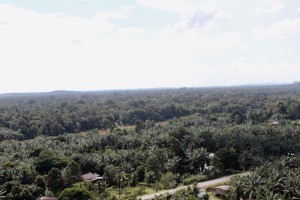
By Johana Sanabria
johana8715@gmail.com
csanabriaa@usfca.edu.co
